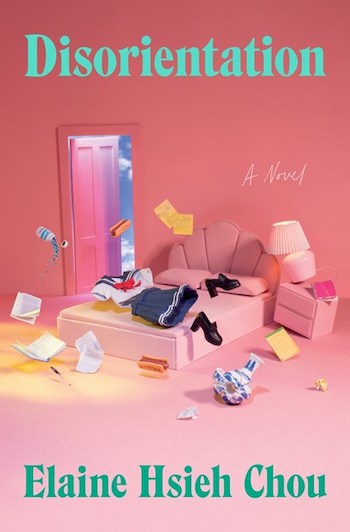[ad_1]
In the conversation surrounding Elaine Hsieh Chou’s debut novel Disorientation, I expect to see discussion of her carefully crafted satire, her inclusion and destruction of campus tropes, and the meticulous unpacking of Asian American identity in the lens of violence and fetishism. These should all be discussed, but I hope the conversation also includes its readability. Because the novel is captivating, irresistible, and intensely readable, and what we ultimately come to literature to find.
Disorientation follows Ingrid, a final year Ph.D. student struggling with her dissertation on Chinese-American poet Xiao-Wen Chou. Unlike many of her colleagues in Asian American studies, Ingrid is Asian American, of Taiwanese descent, and frequently finds herself in awkward, deferential situations among white male colleagues. Upon discovering a research tidbit that challenges her studies, her university, and her own self-perception, Ingrid risks her every meaningful relationship in her pursuit of truth and equity. And of course, hilarity ensues.
It can be difficult to envision a book tackling themes of identity, systemic discrimination, and exclusion as laden with humor, but this book certainly delivers. With all characters exaggerated to larger-than-life proportions, from social justice activist Vivian to department head Michael to affectionate fiance Stephen, we as readers can take a step back and find the hypocrisy woven in. As Ingrid navigates her relationships with each of these people, witnessing herself growing and changing as a result, the narrative moves at a snappy pace and keeps the reader careening into the next chapter.
Even more apparent is Ingrid’s own exaggeration. As the figure through whom the story is filtered, our voices rise to high decibels as we scream at her to move, to act, to make different decisions. Her uncertainties and stubbornness highlight an inner core of self-loathing, a separatist perspective that many Asian Americans can relate to. Drawing harsh lines between the self and others. They’re simply “too Asian,” and Ingrid can’t relate.
The book expands in scope with each passing page, integrating newer and more experimental forms and swallowing larger subject matter. We begin at the campus novel, at critiques of university hierarchy, and end up considering all of American politics and the evolution of racism, fetishism, and social stratification. In many ways, the book holds up to the challenge, but in its effort to balance its varying themes and relationships, the novel can read didactic. In some ways, it does attempt to split the difference between nonfiction discourse and engaging fictional satire, and when it veers too far in the former direction, the result is heavy-handedness.
Nevertheless, what Disorientation shows us is that there is power in the page-turner, that literary merit and a unique, propelling story are not mutually exclusive. Of course, those of us who love reading know this already, but books like this show us that it never hurts to be reminded.

FICTION
by Elaine Hsieh Chou
Penguin Press
Published on March 22, 2022

[ad_2]
Source link

